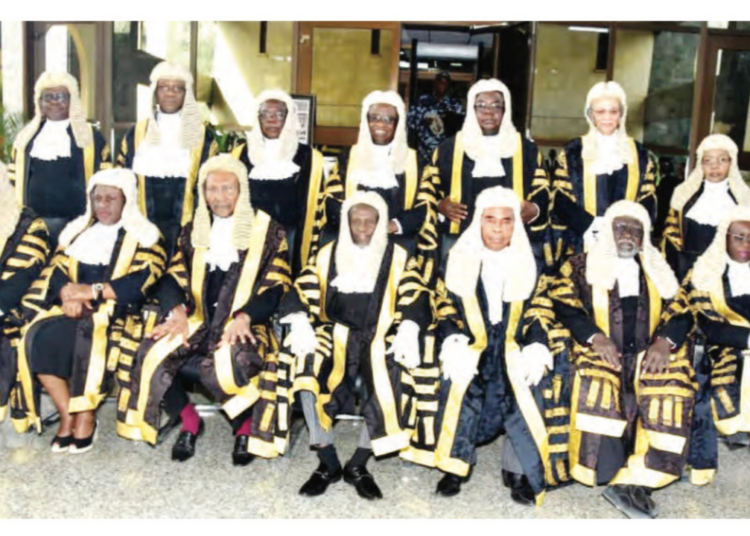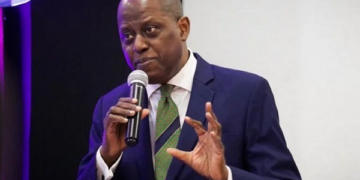Since the Election Petitions Tribunals and the Courts of Appeal across the country began to pass their verdicts on the various petitions, a cacophony of voices have continued to dominate the public space in the propriety or otherwise of the roles of the Judiciary.
This analysis is not a treatise about the role of Judiciary in our constitutional democracy, it is merely to highlight the fact that the Judiciary is part of the electoral process. Unfortunately, some public commentators and members of the general public tend to give the naive impression that the Judiciary is putting democracy in danger. These are largely subjective assumptions!
Of late, many have been particularly miffed by the welter of negative public opinions on the mandate of the Judiciary. There have been series of derogatory retorts in certain circles on the Judiciary such as “judicial robbery”, “judicial rascality”, “stolen mandate”, “kangaroo courts”, “judiciocracy” but some of these even coming from Lawyers who are learned and trained in the Law. In some quarters, the Judiciary has received eulogies with affectionate sobriquets like “last hope of the common man”, “the hallowed temple of Justice”, “beacon of democracy”, so on and so forth.
Positions of the Law on the Role of the Judiciary In Our Electoral Process*
In recent times, the Nigerian Judiciary has been the most insulted institution in Nigeria, simply for the fact that it does not pander to the sentiments, especially, of bad losers.Suffice it to say that this is not the first time that the Judiciary is taking part in the electoral process. Such role dates back to 1979 and spilled into 1999, 2003, 2007, 2011, 2015, 2019, and 2023.
Against the backdrop of negative opinions, it would be unthinkable to assume that the Judiciary just came out of the blues and imposed itself on our electoral process. The mandate and power of this important arm of government to adjudicate on electoral disputes have been donated by the laws of the land, viz: the 1999 Constitution (as amended), the 2022 Electoral Act, the Election Regulations and Guidelines, the Election Tribunal and Court Practice Directions 2022, and Case Law.
Section 6 of the 1999 Constitution (as amended) has recognized the Judiciary and vested judicial powers of the Federation in the Courts. As to the roles of this arm of Government in the electoral process, there is no gainsaying the fact that Election Tribunals are a creation of section 285 of the 1999 Constitution..in like manner, part viii of the 2022 Electoral Act has expressly empowered the Courts to adjudicate on electoral disputes. It goes without saying that the power of the Judiciary to partake in the electoral process was not acquired peremptorily, but was donated by extant laws and statutes.
Election Tribunals As Avenues for Correcting Electoral Wrongs
Many Nigerians have completely divergent view from those of cynics and peevish critics of the Judiciary on its handling election in Nigeria. It is with a rather positive mindset that they have severally regarded the Judiciary as the “guardian angel of the rule of law and democracy in Nigeria”. Without the Judiciary, there would be anarchy in our democratic culture.
Election Tribunals, being avenues for rectifying and correcting wrongs in elections, protect the sanctity and promote the sustenance of democracy. They are avenues for hearing the complaints of aggrrieved parties against an undue election or an undue return. Given that elections, with their sometimes volatile outcomes, are means for throwing up leaders or elected representatives, the process needs to be valid and transparent.
Part of the reasons behind some of the vitriolic attacks on the Judiciary on outcomes of judicial decisions has to do with the peculiar nature of election petitions. In dealing with election petitions, the Courts or Tribunals are expected to demonstrate judicial activism. the nature of its assignment, This means that the Tribunals do not adjudicate through perfunctory fiat. They are guided by the legal framework as prescribed by the Constitution, Electoral Act and established Procedures.
Inadvertently, election petitions are sui generis (“in a class of its own”) and the manner of dispensing justice on them is not conventional but of a special kind. The Court of Appeal in Orji v. PDP ( 2009)14 NWLR Pt.1161, P.310 has accordingly described the peculiar nature of Election Petitions Tribunal.
The Plateau Governorship Petition and the Question of Substantial Justice
The hullabaloo trailing the verdict of the Court of Appeal on the Plateau State Governorship Petition has continued to attract public comments. Though, a layman would join the fray in giving his perspective on the judgment.
The duty of judges on the Election Tribunals is to determine whether an election was done in substantial compliance with the provisions of the Electoral Act. The question is, was substantial justice done by the Court of Appeal in the Plateau State Governorship Petition? From the reading of the judgement, it could be concluded that politicians are paying for their failures in conducting credible congresses that led to the election.
In the case of Dr Nentawe Yilwatda Goshwe v. Barr. Caleb Mutfwang (2023), several issues were formulated for determination by counsel on both sides. While ground one of the Petitioner’s claims centered on sponsorship and qualification. It has argued the non-qualification of the PDP candidate on the ground that he was not validly sponsored by his Party, the PDP’s counter-claims hinged on the issue of jurisdiction, with the argument that the APC’s Petition is a pre-election matter, hence it cannot be heard.
A 3-member panel chaired by Justice E.O. Williams-Dawodu with Okon Abang and and Justice AbdulAzeez Waziri, sat on the appeal. After meticulous findings, they passed their verdicts, nullifying the election of Governor Caleb Mutfwang on ground of non-qualification and invalid sponsorship..
From the understanding of the position of the law on the issue of qualification of a candidate, section 134(3) of the Electoral Act 2022 obviously settled the matter. It provides that a person is deemed to be qualified for an elective office and his election cannot be questioned on ground of non-qualification if, concerning the particular election in question, he meets the applicable requirements of sections 65, 100, 131 and 177 of the Constitution.
The implication here is that where a petitioner satisfactorily proves before the Tribunal that the winner of the election is not qualified to contest the election, therefore, the candidate who came second will have to be declared winner of the election.
On the question of jurisdiction on account of the petition being a pre-election matter as argued by the PDP, the Court of Appeal overulled the respondents and held that the issue of sponsorship and qualification is both a pre-election and post-election matter. Reference was made to Court of Appeal’s decision in Alkalii v. Agah (2022) and other judicial authorities. The Court of Appeal would always maintain consistency and cannot be seen to be overuling itself, except in exceptional cases.
Some critics of the recent Court of Appeal’s judgment on the Plateau State Governorship petition tend to argue that disobedience to Court order is not one of the grounds for disqualification as provided for in section 177 of the Constitution. This is not so. The Court of Appeal duly applied the law, simpliciter. Section 177(c) provides that “a person shall be qualified for election to the office of Governor of a State, if he is a member of a political party and is sponsored by that political party”.
In the instant case, the Court held that the judgment of the Plateau State High Court which the PDP disobeyed is judgment in rem, hence as a result of the refusal to comply with the order to conduct proper congresses the PDP does not exist on the eyes of the law. The Court held that “disobedience to court orders is not an internal affair of the Party. The judgment was in rem and compliance must be total and not partial. Effect of non-compliance is like an earthquake. Parties must obey the rule of law and not the rule of might”.
The Appeal Court thus adopted the legal principle in Macfoy v. UAC (1961) All ER 1169 where Lord Denning held that “You cannot put something on nothing, and expect it to stand there; it will collapse” in deciding that because the PDP lacks a valid structure, any candidate that stands on its platform, is not qualified to contest”.
This is a case law that would further enrich the contents of the Constitution and the Electoral Act which are part of our electoral jurisprudence.
This is not the first time that a Governor has been removed by the Tribunal. It happened in Edo, Rivers, Bayelsa, Zamfara and Imo States at various times. As it stands now, Governor Caleb Mutfwang would be appealing to the Supreme Court. It is a fact that for the apex Court, the most important consideration is the interest of justice, and indeed, justice would be served. The judicial opinion of the Supreme Court shall be final whether correct or not, and no further force will undo it.
Without prejudicing the decision of the apex Court, Plateau State may be heading for off-cycle election alongside some few other States. This is not an aberration but rather a fallout of a flawed electoral process being corrected by the Courts and Tribunals.
To say that the Judiciary is part of the electoral process is an understatement. It started from 1979 till date What some commentators often refer to as judicial interference in the electoral process is not a disruption but a necessary intervention for the health and sanctity of our democracy.
We’ve got the edge. Get real-time reports, breaking scoops, and exclusive angles delivered straight to your phone. Don’t settle for stale news. Join LEADERSHIP NEWS on WhatsApp for 24/7 updates →
Join Our WhatsApp Channel










